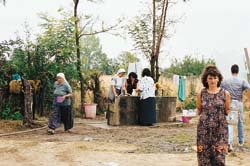Official Development Assistance (ODA)
1. Japanese NGOs' Activities to Assist Kosovar Returnees
Following the recent peace accord between NATO and the Yugoslav government, ethnic Albanian refugees began returning to Kosovo even more quickly than initially anticipated by the Office of the United Nations High Commissioner for Refugees (UNHCR). As of late July 1999, only one month after the accord, more than 80 percent of the refugees had already returned.
Several problems have delayed the task of rebuilding Kosovo. Many houses and other buildings, particularly those near the western border with Albania, have been heavily damaged or destroyed and thousands of landmines remain deployed. However, the repatriation of displaced refugees has made substantial progress despite these obstacles. Many returnees have taken up temporary shelter in tents, houses under repair, and schools and other public buildings.
Numerous NGOs have been working to provide aid lifelines to the Kosovar returnees. However, Japanese NGOs faced one setback in that the NGOs initially allowed to move into Kosovo together with NATO forces had been selected from the outset. Furthermore, whereas many of the western NGOs were able to harness their specialties, extensive networks, and financial power for aid activities on a large scale, the Japanese NGOs had to appeal through their specialties and negotiate for the areas of Kosovo in which they hoped to operate. Despite these circumstances, several Japanese NGOs secured areas for operation and began analyzing the need for specific types of aid. They included Peace Winds Japan, Japan Emergency NGOs (JEN), the Japanese Red Cross Society, and the Medical Relief Unit, Japan (MeRU). Their assistance activities range from the transport and construction of 500 temporary housing units donated by Hyogo Prefecture, to the distribution of home repair kits, and the repair of school structures to the provision of medical supplies and equipment and the operation of mobile medical teams.
To assist the refugee relief operations of Japanese NGOs in Kosovo, the Japanese government has flexibly supported subsidies for NGOs and grant assistance for grassroots projects, and has hammered out new support initiatives for NGOs engaged in the field of emergency humanitarian relief. As NGO projects in Kosovo take shape in the months ahead, the government plans to devise and implement more substantive support measures that effectively harness these frameworks.

These refugees, their homes destroyed,
have taken up temporary shelter in a local school
(Kosovo, July 1999).

These refugees, their homes destroyed,
have taken up temporary shelter in a local school
(Kosovo, July 1999).
